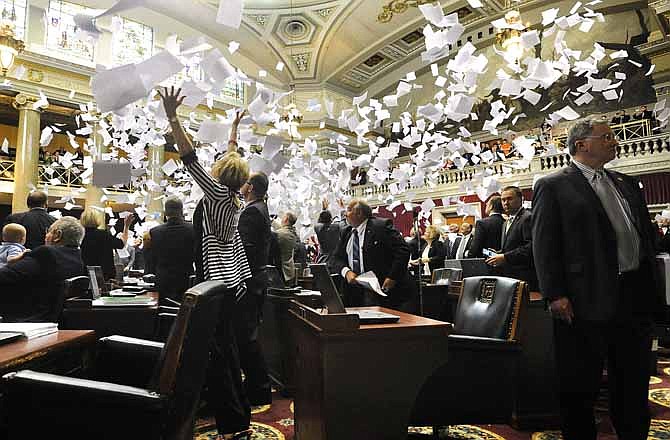State Sen. Mike Kehoe said at his first two veto sessions, he was "in and out within hours."
"But, those first two years there were four or five bills that got vetoed that were talked about - and one last year that actually made it to the floor," Kehoe, R-Jefferson City, said last week.
This year there are 29 vetoed bills, and Kehoe said more than half of them are receiving attention throughout the state.
"My guess this year is that it will take a little longer than a day," Kehoe said. "I know the (Senate) Majority Floor Leader, Sen. (Ron) Richard from Joplin, has said, "Be prepared for Thursday and possibly Friday.'"
The Missouri Constitution states a veto session cannot "exceed ten calendar days." The session this year begins Wednesday.
One of the bills up for possible veto override is House Bill 253, a 177-page bill that proposes, among other things, to cut income taxes on personal incomes and businesses, and to increase taxes on textbooks and prescription drugs.
Gov. Jay Nixon vetoed the bill, stating in his veto letter that it "is an ill-conceived, fiscally irresponsible experiment that would inject far-reaching uncertainty into our economy, undermine our state's fiscal health, and jeopardize basic funding for education and vital public services."
The bill will start in the House for possible override, and must receive 109 votes to proceed to the Senate.
House Bill 436 is another controversial bill that will start in the House. The bill seeks to nullify every federal gun law ever passed, or that ever will be passed.
Rep. Jay Barnes, R-Jefferson City, said he's not certain either bill, House Bill 253 or House Bill 436, will pass.
"With House Bill 253, I think it's fairly clear from at least six Republicans who have said publicly they're going to vote "No' on the bill, that it's not going to pass out of the House," Barnes said. "House Bill 436 has fatal, constitutional defects and real-world consequences that should prevent its passage by the House of Representatives as well."
Kehoe said there are a few bills flying under the radar that he thinks are really important - one of them regarding unemployment benefits.
He said House Bill 611 is "very important to people who need and deserve unemployment benefits to keep the folks who are getting it fraudulently out of the system."
Barnes feels strongly against the override of Nixon's veto of House Bill 650.
In one section, the bill caps punitive damages at $2.5 million in any case involving the ownership, maintenance, management, or control of "underground hard rock mining or hard rock milling sites that ceased operations prior to January 1, 1975."
In his July 12 veto letter, Nixon argued the language had several problems, including creating the possibility of "considerable inequities among individuals who may have been harmed by the same defendants under similar circumstances, simply because certain parties were not as fast to the courthouse."
Nixon also said the bill was an unconstitutional "special law" because it would benefit only those companies whose operations stopped before Jan. 1, 1975.
The St. Louis-based Doe Run Co. - which the Missouri Chamber of Commerce and Industry said Friday is the largest lead producer in the Western Hemisphere - would be the main beneficiary of the law, and has been telling some lawmakers it might have to stop doing business in Missouri unless the veto is overridden.
Barnes said the Legislature should have no interference in civil court cases.
He said there is a prohibition on special legislation in Missouri's Constitution and the Legislature is not well-positioned to make judgments on individual cases.
"It's nonsense," Barnes said. "The Legislature is meddling in an ongoing legal dispute that's already set for trial to be heard in front of 12 regular Missourians."
Also in this series:
Several bills on docket for 2013 veto session
HB 253 - Cutting taxes is focus of veto session's controversies

